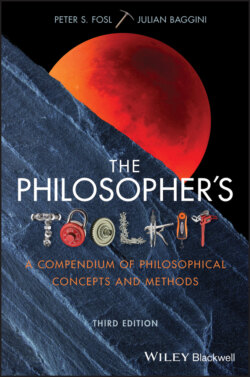Читать книгу The Philosopher's Toolkit - Julian Baggini, Julian Baggini - Страница 42
1.5 Invalidity
ОглавлениеGiven the definition of a valid argument, it may seem obvious what an invalid one looks like. Certainly, it’s simple enough to define an invalid argument: it is an argument where the truth of the premises does not guarantee the truth of the conclusion. To put it another way, if the premises of an invalid argument are true, the conclusion may still be false. Invalid arguments are unsuccessful deductions and therefore, in a sense, are not truly deductions at all.
To be armed with an adequate definition of invalidity, however, may not be enough to enable you to make use of this tool. The man who went looking for a horse equipped only with the definition ‘solid‐hoofed, herbivorous, domesticated mammal used for draught work and riding’ (Collins English Dictionary) discovered as much, to his cost. In addition to the definition, you need to understand the definition’s full import. Consider this argument:
1 Vegetarians do not eat pork sausages.
2 Gandhi did not eat pork sausages.
3 Therefore, Gandhi was a vegetarian.
If you’re thinking carefully, you’ll have probably noticed that this is an invalid argument. But it wouldn’t be surprising if you and a fair number of readers required a double take to see that it is in fact invalid. Now, this is a clear case, and if a capable intellect can easily miss a clear case of invalidity in the midst of an article devoted to a careful explanation of the concept, imagine how easy it is not to spot invalid arguments more generally.
One reason why many will fail to notice that this argument is invalid is because all three propositions are true. If nothing false is asserted in the premises of an argument and the conclusion is true, it’s easy to think that the argument is therefore valid (and sound). But remember that an argument is valid only if the truth of the premises guarantees the truth of the conclusion in the sense that because of the argument’s structure the conclusion is never false when the premises are true. In this example, this isn’t so. After all, a person may not eat pork sausages yet not be a vegetarian. He or she may, for example, be an otherwise carnivorous Muslim or Jew. He or she simply may not like pork sausages but frequently enjoy turkey or beef.
So, the fact that Gandhi did not eat pork sausages does not, in conjunction with the first premise, guarantee that he was a vegetarian. It just so happens that he was. But, of course, since an argument can only be sound if it’s valid, the fact that all three of the propositions it asserts are true does not make it a sound argument.
Remember that validity is a property of an argument’s structure of form. In this case, the form is:
1 All Xs are Ys.
2 Z is a Y.
3 Therefore, Z is an X.
Here X is substituted for ‘vegetarian’, Y for ‘person who does not eat pork sausages’, and Z for ‘Gandhi’. We can see why this structure is invalid by replacing these variables with other terms that produce true premises but a clearly false conclusion. (Replacing terms creates what logicians call a new ‘substitution instance’ of the argument form.) If we substitute ‘cat’ for X, ‘meat eater’ for Y, and ‘the president of the United States’ for Z, we get:
1 All cats are meat eaters.
2 The president of the United States is a meat eater.
3 Therefore, the president of the United States is a cat.
The premises are true, but the conclusion clearly false. This cannot therefore be a valid argument structure. (Showing that an argument form is invalid by making substitutions that result in true premises but a false conclusion is called showing invalidity by ‘counterexample’. It’s a powerful skill well worth cultivating. See 1.7 and 3.12.)
It should be clear now that, as with validity, invalidity is not determined by the truth or falsehood of the premises but by the logical relations among them. This reflects a wider, and very important, feature of philosophy. Philosophy is not just about saying things that are true or wise; it’s about making true claims that are grounded in solid arguments. You may have a particular viewpoint on a philosophical issue, and it may just turn out by sheer luck that you’re right. But, in many cases, unless you can demonstrate that you’re right through good arguments, your viewpoint is not going to carry any weight in philosophy. Philosophers are not just concerned with the truth, but with what makes it the truth and how we can show that it’s the truth.
